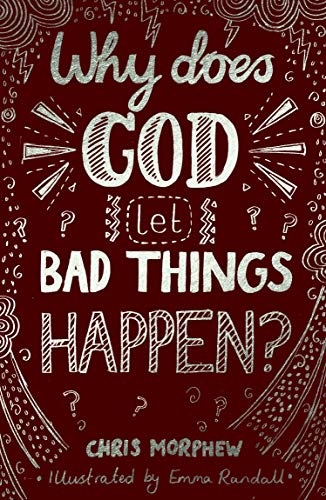Why Does God Let Bad Things Happen?
(Apologetics for Christian Kids and tweens why does God allow suffering?)
Chris Morphew
BOOK REVIEW

The question of suffering and the presence of evil in the world is one that haunts every corner of human existence. Deep and resonant, this inquiry has puzzled theologians, philosophers, and everyday individuals alike throughout history. In Why Does God Let Bad Things Happen?, Chris Morphew dives into this complex topic tailored specifically for a younger audience-kids and tweens-inviting them to grapple with profound questions in a digestible yet impactful manner.
What Morphew does remarkably well is craft a narrative that doesn't shy away from the intensity of suffering while connecting to the innocent curiosity of children. The illustrations sprinkled throughout the book serve not just as decoration but as a means of enhancing understanding-making dense theological concepts relatable and engaging. A bright, inviting design invites young minds into a conversation that is often too complex for them to navigate alone.
In a world where children are bombarded with the harsh realities of life-be it through news cycles or personal experiences-the questions surrounding suffering become almost inevitable. Why does God allow terrible things to happen? How do we reconcile a loving deity with the horrors we see around us? Morphew doesn't merely provide answers; he ignites a spark of introspection and dialogue. The narrative encourages readers to reflect inwardly, digging deep into their feelings of anger, confusion, or sorrow, thereby crafting a safe space for exploration.
The author's background in theology allows him to infuse his writing with a depth of understanding yet remains accessible. The book offers not just platitudes but rather a framework for young readers to piece together their faith amidst the chaos of life. It's a revelation that resonates: understanding the concept of suffering can foster resilience and empathy in young hearts. This is revolutionary for the age group it's aimed at-children who often feel powerless when faced with overwhelming circumstances.
Critics and readers alike have observed how Morphew's work stands out in the realm of Christian literature for kids-both for its candidness and its genuine care for the audience. Some reviews laud the book's ability to open important discussions within families, allowing parents and children to engage together on tough topics. Others, however, express concern that the weighty subject matter might be too intense for some youngsters, particularly those who might not yet have faced significant adversity. It's a testament to the different frames of reference each reader brings to the text, illustrating the diverse conversations it can foster.
Much of what Morphew writes hinges on the idea that suffering isn't merely to be solved but understood. He introduces young readers to the notion that trials can lead to maturity, empathy, and a deeper connection with their faith. In doing so, Why Does God Let Bad Things Happen? becomes more than just a guide to understanding suffering; it is a stirring call for agency in times of despair. It empowers kids to ask hard questions and seek answers, instead of shying away from their struggles.
As Morphew navigates these turbulent waters, he emphasizes the importance of community and conversations about faith, encouraging children to remember that they are never alone in their sorrow. This perspective is critical in a global society that often prizes individualism over collective support. He captures a vision of fellowship that reminds us all: in times of darkness, we can lean on one another.
So why should you explore this book? Because it equips generations to engage with one of the most challenging questions of existence-and it beautifully illustrates that even in suffering, there is a promise of light. You'll not only find answers; you'll discover a roadmap that leads through tumultuous terrains of doubt, anger, and grief, paving the way for hope, understanding, and possibly even healing.
Why Does God Let Bad Things Happen? beckons readers to not merely skim its pages but to dive deep-immerse yourself in profound inquiries that will linger in your heart long after the last illustration. This isn't just a book you read; it's a launching pad for understanding life's most inexplicable challenges and a way to foster connections through shared struggles.
As readers, we must ask ourselves-are we willing to not only explore this question, but also to come alongside others as they wrestle with it? Because wisdom often emerges from collective journeys through uncertainty, and that's what Morphew so eloquently captures. Don't miss the chance to uncover this enlightening dialogue that has the potential to influence generations-one young heart at a time.
📖 Why Does God Let Bad Things Happen?: (Apologetics for Christian Kids and tweens: why does God allow suffering?)
✍ by Chris Morphew
🧾 96 pages
2021
#does #things #happen #apologetics #christian #kids #tweens #does #allow #suffering #chris #morphew #ChrisMorphew